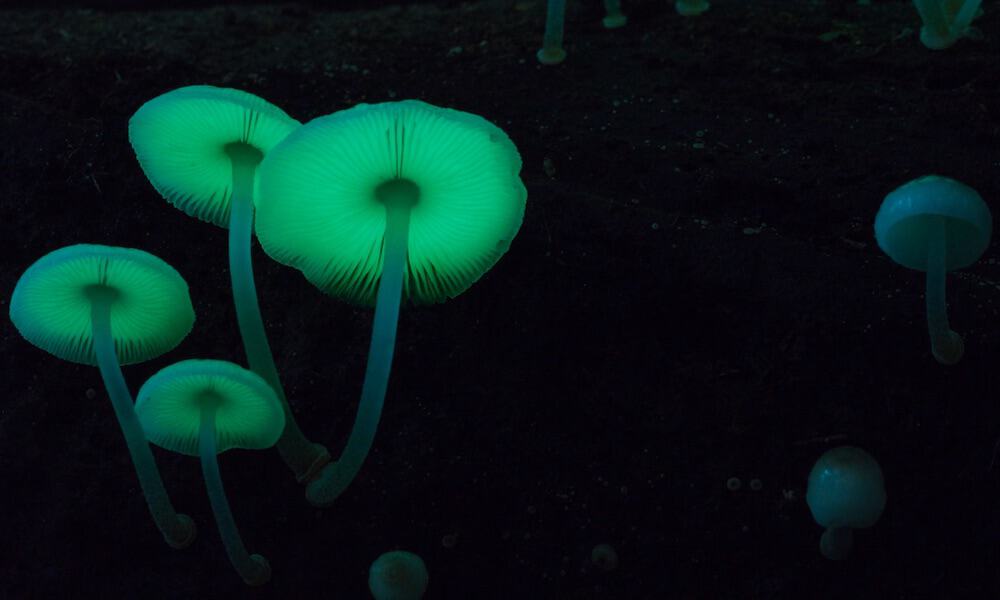
Academy Award-winning actress Brie Larson may have just given us her most dramatic role to date, delivering compelling first-person narration as the voice of an army of mushrooms in the new documentary, Fantastic Fungi. The feature-length film digs deep into the world of the captivating yet mysterious organisms that feed on organic matter and break down plant life. From molds and yeast to mushrooms and toadstools, fungi have been around for 3.5 billion years, and this eponymous film uncovers why the incredible life form remains so important to us as humans today.

Spoiler Alert. The film includes interviews with a number of scientists, professors, doctors, journalists, and others, including famous physician Dr. Andrew Weil. The film’s central figure is Paul Stamets, a mycologist who is a writer, speaker, researcher and entrepreneur working in the world of fungi. As a youth, Stamets had a horrible stutter and had trouble looking people in the eye. Influenced in part by Dr. Andrew Weil’s book, Altered States of Consciousness, Stamets decided to take ten times the normal dose of psychedelic mushrooms, finding himself on top of a tree in the midst of a thunderstorm. After some very powerful hallucinatory experiences, he came down from the tree, whereupon he lost his stutter and was suddenly able to start looking people in the eye.

“Mushrooms represent rebirth, rejuvenation, regeneration. Fungi generates soil that gives life,” Stamets says in the film. “If we don’t get our act together, and come in commonality and understanding with the organisms that sustain us today, not only will we destroy those organisms, but we will destroy ourselves.”

In Fantastic Fungi, we learn that mushrooms are the fruit of mycelium, an underground network that curiously shares a similar structure with the internet. The vegetative part of fungus, mycelium enables trees to communicate and feed one another. In fact, there’s a theory that because our ancestors started to consume mushrooms, the complex structure of mycelium changed our brains, and that’s how we evolved into the humans we are today. In the words of ethnopharmacologist Dennis McKenna (brother of famed psychedelics advocate Terence McKenna): “It’s not so simple to say that [our ancestors] ate psiloybin mushrooms and suddenly the brain mutated. I think it’s more complex than that. But I think it was a factor.”

Fantastic Fungi touches on the divide between eastern and western medicine, and the use of fungi in holistic healing practices. “I recommend mushrooms and mushroom products frequently to patients and I teach other doctors about their uses,” Dr. Weil says in the film. “Mushrooms are completely unusual organisms and they’re ignored by so many people, and yet they’re a vital interface between all forms of life.”

Not only do mushrooms facilitate our connection to nature, but research has shown that they can stimulate the regrowth of nerves, carrying the potential to treat Alzheimer’s and help with treatment-resistant depression. Sadly, a lot of the research on mushrooms has been stymied for a number of reasons. In the words of Ronald Griffiths, a professor of neuroscience at Johns Hopkins University, “The movement to marginalize the major psychedelics is incredibly complex. I mean, it plugged in to a counterculture movement, an antiwar movement, an antiestablishment movement. But there are many, many forces that were at play.”

As a result of all these dramatic shifts in society in the 1960s, psychedelics became a scapegoat and much of the related research was halted and buried. But now, our worldview is changing. We’re gaining a new perspective on reality and psychedelic research is being revived. There are more and more opportunities to study the effectiveness of mushrooms, not just for medicine, but to filter water, create compostable packaging, and even to serve as raw material in the making of batteries.

Fantastic Fungi is something of a live-action fantasy film in the form of a documentary, with video game-level graphics that are alternately mesmerizing and slightly gross—sometimes both. The time-lapse footage is so visually stunning, it feels like it belongs in an IMAX movie. It comes as no surprise, then, that among the filmmaker’s many credits is the Soarin’ Around the World IMAX ride film at Disney Theme Parks. In fact, director Louie Schwartzberg is a pioneer in the field of 35mm time-lapse filmmaking, having devoted himself to the medium for nearly 40 years.
Schwartzberg was drawn to making a film about fungi for several reasons. “Fungi can clean the environment, heal our bodies, and shift our consciousness,” he writes in a director’s statement. “Yet the biggest discovery for me, beyond the science and challenge of making the invisible visible, is that they are the model for how life can flourish, a shared economy under the ground, an intercellular network that share nutrients for ecosystems to thrive. This modality needs to be brought from below to above the ground.”

The post <em>Fantastic Fungi</em> Is A New Documentary That Celebrates The World Of Mushrooms appeared first on High Times.


Comments
Comments are disabled for this post.